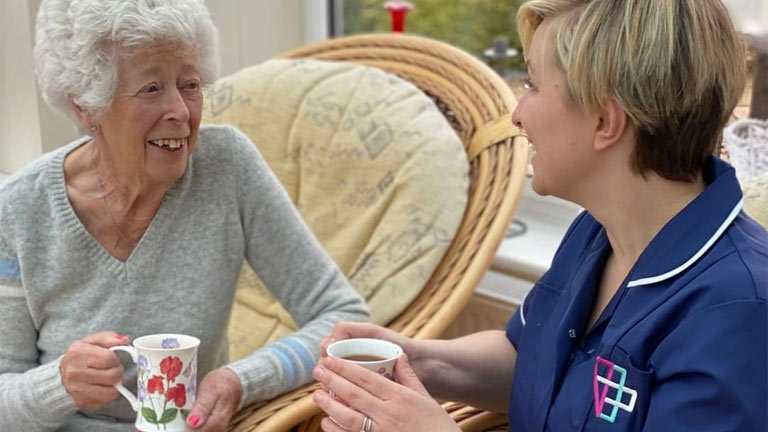
Hiring a nurse for at-home care is a significant decision that requires careful consideration. Here, we explore the nuances of hiring a home nurse, touching upon the human-centered aspects that are crucial in making an informed and compassionate choice.
Understanding the Personal Qualities of a Good Nurse
A good home nurse is someone who displays empathy, patience, and understanding. These are not qualities that can be easily discerned from a resume but are found in the stories they tell about their work.
Evaluating Professional Competence and Credentials
Professional competence and proper credentials are non-negotiable when hiring a nurse for home care. A nurse must be licensed to practice in your state, and their training should be up-to-date with current medical practices.
This includes being skilled in specific medical procedures that the patient may require, from wound care to administering medications.
It is essential to request and verify all their professional documents, including their nursing license, certifications, and proof of ongoing education. Don’t hesitate to ask about their experience with conditions similar to what your loved one is experiencing.
This can include asking for scenarios or situations where they had to apply their medical knowledge urgently and how they coped with the stress that comes with the job.
Integrating the Nurse into the Family Dynamic
When a nurse is hired for in-home care, they become a part of the day-to-day life of the family, which can be as complex as it is intimate. This integration requires a delicate balance; the nurse needs to be professional yet personable, offering support without overstepping.
It’s essential to discuss how the nurse will fit into the existing family dynamic, including interaction with family members, participation in daily routines, and understanding family roles and expectations.
Families should take the time to introduce the nurse to the patient’s likes, dislikes, and hobbies to foster a more personal connection. A good in-home nurse will take these details into account to provide care that is not only medically sound but also personally enriching for the patient.
For example, if the patient enjoys music, the nurse might incorporate their favorite tunes into their daily routine.
Discussing and observing holidays, celebrations, and family traditions can also help the nurse to blend into the family environment.
Ensuring that the nurse understands and respects these aspects can go a long way in creating a harmonious living situation. It’s also crucial for the family to recognize the nurse’s needs and boundaries, fostering mutual respect.
Creating a Safe and Welcoming Environment
Creating a safe and welcoming environment goes beyond clean living spaces and medical supplies. It involves building a relationship based on trust and respect between the patient, their family, and the nurse.
Establishing clear communication lines is critical. This means setting expectations right from the start about schedules, duties, and the way feedback will be communicated.
Discuss with the nurse the importance of cultural sensitivity and respect for the patient’s preferences and routines. It is essential that they understand and align with the family’s values and ways of life.
Also, consider the patient’s privacy and personal space, ensuring that the nurse is aware of boundaries and the importance of maintaining confidentiality.
Safety also extends to the emotional and psychological well-being of the patient. The nurse should be someone who contributes positively to the atmosphere of the home, offering support and encouragement and being a comforting presence rather than a clinical one.
Navigating Legal Considerations and Rights
When hiring a nurse at home, you are becoming an employer, and with that comes specific legal responsibilities. You should be aware of the labor laws in your state, including those related to working hours, overtime compensation, and benefits. It’s wise to consult with an attorney to draft a contract that outlines the terms of employment, duties, payment, and termination conditions.
In the unfortunate event that there are signs of nursing abuse at home or at a nursing home, it’s imperative to take immediate action. This could include documenting the abuse, reporting it to the authorities, or suing a nursing home for negligence to protect your loved one and hold the appropriate parties accountable.
Maintaining Professional Boundaries in a Personal Setting
While integrating a nurse into the family dynamic is vital, it is equally important to maintain professional boundaries. The home is an inherently personal space, which can sometimes blur the lines between professional and personal relationships.
Establishing boundaries from the outset can prevent issues related to overfamiliarity, which may lead to a lack of respect for the nurse’s professional opinion or challenges in managing the care provided.
One way to maintain these boundaries is to have clear policies regarding the nurse’s hours of work, responsibilities, and space within the home.
For instance, if the nurse is live-in, they should have a private area where they can retreat during their off hours. This physical boundary can help reinforce the professional nature of their role.
Conclusion
Hiring a nurse for at-home care is a complex task that intertwines the human touch with professional rigor. By focusing on the personal qualities of the nurse, verifying their professional credentials, fostering a safe and respectful environment, understanding legal responsibilities, and being vigilant against abuse, you can make a well-informed decision that ensures the highest standard of care for your loved one.
This careful approach honors the vulnerability of those in need of care and the trust placed in those we choose to provide it.




